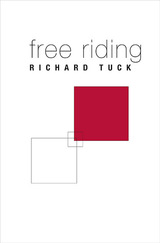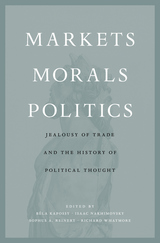
One individual’s contribution to a large collective project—such as voting in a national election or contributing to a public television fund-raising campaign—often seems negligible. A striking proposition of contemporary economics and political science is that it would be an exercise of reason, not a failure of it, not to contribute to a collective project if the contribution is negligible, but to benefit from it nonetheless.
But Richard Tuck wonders whether this phenomenon of free riding is a timeless aspect of human nature or a recent, historically contingent one. He argues for the latter, showing that the notion would have seemed strange to people in the nineteenth century and earlier and that the concept only became accepted when the idea of perfect competition took hold in economics in the early twentieth century.
Tuck makes careful distinctions between the prisoner’s dilemma problem, threshold phenomena such as voting, and free riding. He analyzes the notion of negligibility, and shows some of the logical difficulties in the idea—and how the ancient paradox of the sorites illustrates the difficulties.
Tuck presents a bold challenge to the skeptical account of social cooperation so widely held today. If accepted, his argument may over time encourage more public-spirited behavior.

When István Hont died in 2013, the world lost a giant of intellectual history. A leader of the Cambridge School of Political Thought, Hont argued passionately for a global-historical approach to political ideas. To better understand the development of liberalism, he looked not only to the works of great thinkers but also to their reception and use amid revolution and interstate competition. His innovative program of study culminated in the landmark 2005 book Jealousy of Trade, which explores the birth of economic nationalism and other social effects of expanding eighteenth-century markets. Markets, Morals, Politics brings together a celebrated cast of Hont’s contemporaries to assess his influence, ideas, and methods.
Richard Tuck, John Pocock, John Dunn, Raymond Geuss, Gareth Stedman Jones, Michael Sonenscher, John Robertson, Keith Tribe, Pasquale Pasquino, and Peter N. Miller contribute original essays on themes Hont treated with penetrating insight: the politics of commerce, debt, and luxury; the morality of markets; and economic limits on state power. The authors delve into questions about the relationship between states and markets, politics and economics, through examinations of key Enlightenment and pre-Enlightenment figures in context—Hobbes, Rousseau, Spinoza, and many others. The contributors also add depth to Hont’s lifelong, if sometimes veiled, engagement with Marx.
The result is a work of interpretation that does justice to Hont’s influence while developing its own provocative and illuminating arguments. Markets, Morals, Politics will be a valuable companion to readers of Hont and anyone concerned with political economy and the history of ideas.
READERS
Browse our collection.
PUBLISHERS
See BiblioVault's publisher services.
STUDENT SERVICES
Files for college accessibility offices.
UChicago Accessibility Resources
home | accessibility | search | about | contact us
BiblioVault ® 2001 - 2024
The University of Chicago Press









